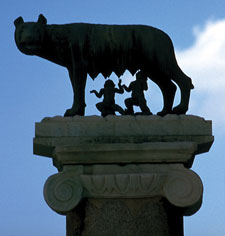- Real Truth Magazine Articles
- EUROPE
 Out of the Ashes – The Rise of Europe – Part 1
Out of the Ashes – The Rise of Europe – Part 1
Subscribe to the Real Truth for FREE news and analysis.
Subscribe NowIn campaigning for France’s presidential election (first round of polls begins April 22), Sègoléne Royal, candidate for the Socialist Party, released her “far left” platform this past weekend.
In a two-hour speech to 10,000 supporters, she pledged to raise pensions, increase the minimum wage (to $2,000 USD a month), and guarantee university students jobs or training within six months after graduating.
With her fist raised and clenched, she said, “I want for the children in these suburbs [north of Paris] what I want for my own children,” prompting a two-minute standing ovation.
Ms. Royal also said she would tax corporations based on the ratio of their profits that are re-invested in equipment and jobs (versus paid to shareholders): “The unfettered rein of financial profit is intolerable for the general interest” (International Herald Tribune).
Ms. Royal wants a stronger Europe that “protects its citizens,” saying, “I don’t want a Europe that is just a free-trade area attached to NATO. Even less do I want a Europe where it’s everyone against everyone and social and fiscal dumping replaces solidarity.”
Her opponent is Nicolas Sarkozy, leader of the main conservative party, the Union for a Popular Movement (UMP), and France’s current Interior Minister. Current polls show Mr. Sarkozy with a lead, although most expect the race to remain very tight. In either case, the outcome will have significant ramifications both for France and the rest of Europe.
Interestingly, Mr. Sarkozy is promoting the formation of a Mediterranean Union, similar to the EU, with which it would work closely and share some institutions, with Turkey a member. (One could also ask whether Israel would join as well.)
Both candidates will head to Berlin during their campaign to establish common ground with Germany, Europe’s leading country, and also to ensure that their election strategy is in sync with German Chancellor Angela Merkel’s agenda as current President of the European Union.
It is expected that Mr. Sarkozy—coming from the same side of the political spectrum as Chancellor Merkel, with similar philosophies and ideas—will receive a warmer welcome than Ms. Royal.
Particularly at issue are their different positions regarding the European constitution. Mr. Sarkozy campaigned for the “yes,” while Ms. Royal supported the “no” side during the French referendum in 2005. Since then, Mr. Sarkozy has suggested a “core” Europe or a simplified version of the constitution, while Ms. Royal has called for a second referendum in 2009.
In either case, Europe is on track for major change in the near future. France will likely play a significant role in the continent’s course.
 Out of the Ashes – The Rise of Europe – Part 1
Out of the Ashes – The Rise of Europe – Part 1